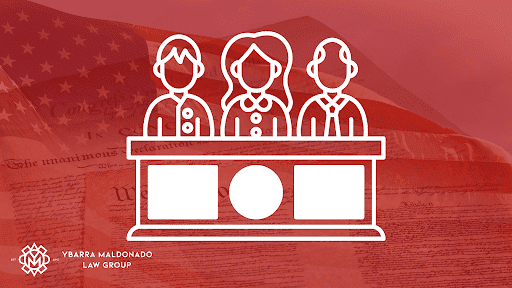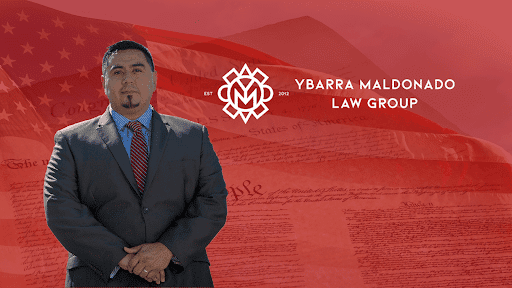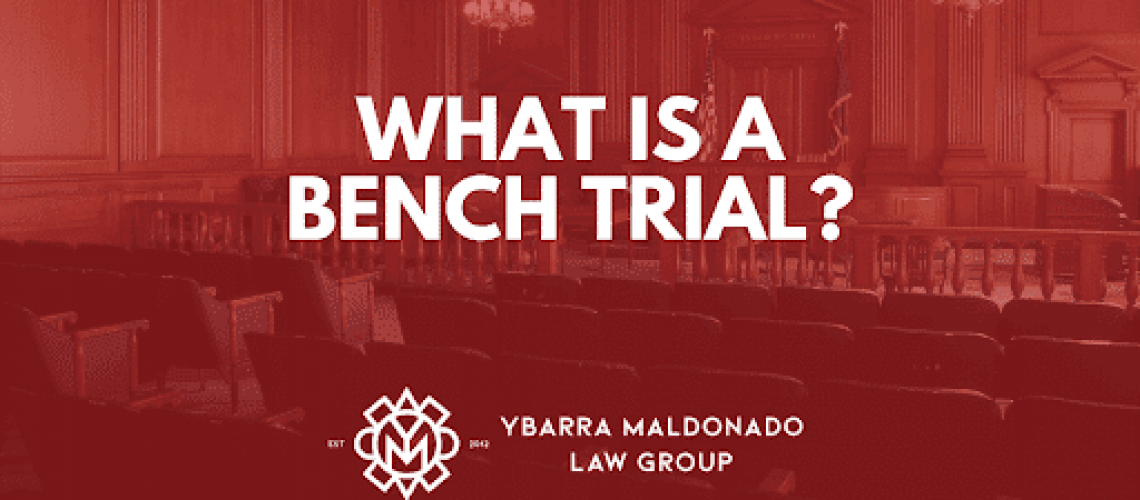Criminal defendants can take their case to trial, either before a judge or jury. They have a couple of options, one of which is a bench trial. But what is a bench trial exactly? While jury trials are much more common and well-known, a criminal trial before a judge is called a bench trial.
The experienced Phoenix criminal defense attorneys at Ybarra Maldonado Law Group will explain the process of how a bench trial works in the criminal justice system and how it compares to a jury trial. If you need qualified criminal defense in Phoenix, call our law firm today at 602-910-4040 to schedule a case evaluation.
Jury Trials vs Bench Trials
A jury trial will typically involve 12 citizens, called jurors. They listen to the legal arguments of both the defendant and prosecutor. They then determine the defendant’s guilt or lack thereof. In jury trials, the final decision must be unanimous. In a jury trial, the judge doesn’t determine guilt or innocence but instead rules on procedural and evidentiary issues. These issues can include a person’s availability to testify, what evidence can be submitted, and other legal matters.
In a bench trial, the judge both rules on procedural and evidentiary issues. They also make the ruling for the defendant’s guilt-whether the defendant was guilty or not guilty.
Regardless of whether your criminal trial is a bench trial or a jury trial, you’re still entitled to certain rights. For example, as a criminal defendant, you’re entitled to a speedy and public trial and adequate legal representation. You are also entitled to an appeal to a higher court if the jury or judge decides that you’re guilty. In either trial process, the same rules apply. Since there isn’t a jury present during bench trials, the bench trial process may be a little more less formal.
Does a Criminal Defendant Have a Constitutional Right to a Bench Trial in Arizona?

For most criminal cases, the defendant has a right to a jury trial, but not to a bench trial.
A defendant may give up, or waive, their right to present evidence in front of an impartial jury. But if the prosecutor or judge rejects the waiver, then the criminal process will proceed with a jury trial.
The Right to Jury Trials Only Applies to Serious Criminal Offenses
Importantly, criminal defendants only have the right to a jury trial when they are accused of a serious criminal offense.
Misdemeanors and petty offenses are not always guaranteed a jury trial.
For example, suppose you are charged with an offense that only carries a six month jail time maximum. In this case, you aren’t guaranteed a jury trial, according to the United States Supreme Court.
How to Decide Between a Jury Trial or a Bench Trial
A defendant may waive his or her right to a jury trial. This defense strategy is not one to take lightly. The decision to waive the right to an impartial jury trial should be made by the defendant, not by the defendant’s attorney. While a criminal defense lawyer can advise on the decision, the decision is ultimately up to the defendant, as they will be the one responsible for the punishment, should the criminal charges stick.
There are specific advantages and disadvantages for both bench trials and jury trials.
Advantages of a Bench Trial
- Faster resolutions: Because a bench trial doesn’t require jury selection, this makes the legal process go a little faster.
- Less irrelevant, damaging information: the prosecution’s job is to persuade a jury that the defendant should be held responsible for the alleged crime. So, oftentimes, the prosecutor will show the defendant in a bad light. Juries tend to be persuaded by emotional arguments that may or may not have anything to do with the case at hand. In contrast, a judge who deals with criminal cases day-in-and-day-out will be more likely to remain neutral when this happens.
- Legal issues: For those with complex criminal cases, the legal rules surrounding the case may confuse the jurors. In fact, many attorneys and legal experts worry that sometimes, the selected jurors forget the jury’s role and choose to ignore the legal rules altogether.
Disadvantages of a Bench Trial
- The judge decides: In a bench trial, the prosecutor only needs to convince a single person that the defendant is guilty, while in a jury trial, your criminal defense lawyer can instill reasonable doubt in any of the 12 jurors.
- All evidence is known: In both bench trials and jury trials, the judge is privy to all of the evidence. He or she decides whether or not that information is admissible in court. Any damaging but irrelevant information is not presented to the jury, during a jury trial. But, since the judge knows everything, it may be difficult to disregard the information, regardless of how professional the judge may be.
- Judges follow the rules: One defense strategy is to persuade the jury by emotional arguments, especially during closing arguments. Defense attorneys often lean on this strategy-hoping that the jury will disregard the criminal law and be sympathetic to the defendant. This doesn’t not happen with judges.
- Pressure to rule a certain way: While this certainly doesn’t apply to our judges in Phoenix, AZ, we realize that we have readers all over the United States. In some cities where corruption is rampant, criminal defense attorneys may worry that a judge will have a pressure to convict if he or she is up for re-election, especially in a very public trial.
You Need an Experienced Phoenix Criminal Defense Attorney if You’ve Been Charged With a Crime

If you are faced with criminal charges in Phoenix and need to decide between a jury trial or bench trial, please speak with an experienced criminal defense attorney before making your final decision, as it very well could affect your freedom. You’ll want to find a criminal lawyer who has defended the specific crime for which you are charged.
At Ybarra Maldonado Law Group, our defense lawyers have extensive experience litigating on behalf of those who are charged with minor offenses all the way up to serious crimes. We’re able to provide meaningful advice and genuinely want the best outcome for each and every client that we serve.
For a case evaluation, call our law firm at 602-910-4040 or fill out our online form.

